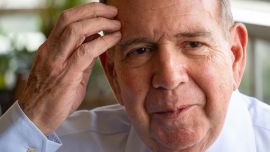After a disappointing video call and an awkward snub at the Group of Seven, Brazil’s Luiz Inácio Lula da Silva and his Ukrainian counterpart Volodymyr Zelenskyy finally have a date.
The pair’s meeting, set for Wednesday, is one of the most anticipated encounters during this week’s UN General Assembly gathering in New York, with the Ukrainian president looking to rally support from a prominent leader who has so far refused to pick sides in the war.
It’s a do-over after Zelenskyy and Lula couldn’t find time for a handshake amid acrimony in May, when they were both invited to a G7 summit of rich countries in Japan. On that occasion, Zelenskyy’s surprise appearance unnerved the Brazilian delegation, which feared a trap had been set up for Lula. Brazil argued that Zelenskyy shared some blame for the war. A March video conference between them yielded no results.
But now both seem to have something to gain despite their past animosity.
Zelenskyy, 45, is rallying support for the 18-month-old effort to repel Russia’s invasion, and gaining even tacit support from Lula would be a major success given the Brazilian leader’s place as one of the most high-profile leaders of the Global South.
He’s also looking to persuade allies and sceptics alike that his army’s counter-offensive will succeed in the end despite only incremental progress so far. After New York, he’ll head to Washington to make his case to Biden’s White House and Congress, where some Republicans have begun to waver.
Lula, 77, is eager to assert Brazil as a powerful force on the world stage. Adding a meeting with Zelenskyy to an agenda that already includes a one-on-one with US President Joe Biden positions the Brazilian as the developing world’s most outspoken champion in New York, especially with India’s Narendra Modi and China’s Xi Jinping both staying home.
The Brazilian president, who also prides himself on having a strong relationship with Russia’s Vladimir Putin, is approaching the meeting with a constructive spirit, according to his top foreign affairs adviser.
“We’ll listen to what Zelenskyy has to say,” Celso Amorim told reporters in New York on Monday. “We can’t anticipate what Lula will say.”
This week’s meeting was again requested by Ukraine, according to two Brazilian government officials familiar with the matter. It’s expected to take place at 4pm on Wednesday at Lula’s hotel, added the officials, who requested anonymity to provide details of a private negotiation. A Ukrainian official confirmed the meeting, without providing details.
Damage control
The meeting will give Lula the chance to fine-tune his position regarding Russia’s invasion of Ukraine, viewed by many among Ukraine allies as erratic and too conciliatory toward Putin.
He’s been in damage-control mode since making comments on the war that irked leaders in Washington and Brussels, including claims that western leaders failed to prevent Russia’s invasion. He has been keen to prove he can still be a neutral arbiter in the conflict and is trying to ensure that the Russia-Ukraine crisis doesn’t put a damper on his G-20 presidency, which started this month.
Yet the task won’t be easy. Earlier in September, Lula said Putin would be free to travel to Brazil for next year’s G20 summit in Rio de Janeiro despite an arrest warrant from the International Criminal Court over alleged war crimes. Lula later backtracked, saying the decision would be up to Brazilian courts.
“Meeting Zelenskyy is part of this process of unwinding a perception that he had been adopting the Russian line,” said Christopher Garman, managing director at political risk consultancy Eurasia Group. “There was a learning curve in the presidential palace about how Lula should position himself in the crisis.”
Lula’s balancing act, if well executed, will be crucial to cementing a shift in his foreign policy agenda that has gradually become more focused on the fight against poverty, the environment and the representation of developing nations in global forums.
Later Tuesday morning, the former metal union leader will deliver the first speech of the week at the UN, a stage he plans to use to intensify his calls for a new model of global governance that gives emerging-market nations a bigger voice in international affairs.
Brazil’s role as the summit’s opener is a matter of tradition. It has also thrust Lula into the spotlight he has sought since completing an astonishing political journey that took him from being one of the world’s most popular leaders between 2003 and late 2010 to prison on corruption allegations before returning to the presidency this year.
Since taking office in January, Lula has visited 20 countries, from major powers like the US and China to peers Argentina and South Africa, campaigning for reforms to institutions like the UN and International Monetary Fund.
“The current global governance model perpetuates asymmetries, increases instability and reduces opportunities for developing countries,” Lula said in Brussels last July, during a summit of Latin American countries and the European Union. “The legitimate concerns of developing countries must be addressed, and we must be adequately represented in decision-making bodies.”
related news

Time for 'democratic transition' in Venezuela, says opposition candidate Edmundo González Urrutia

Mercosur free-trade deal is ‘absolute priority’ for the EU, says chief negotiator

Stories that caught our eye: April 12 to 19

Banned Venezuela opposition leader María Corina Machado insists she is 'Plan A'
by Daniel Carvalho, Bloomberg



















Comments